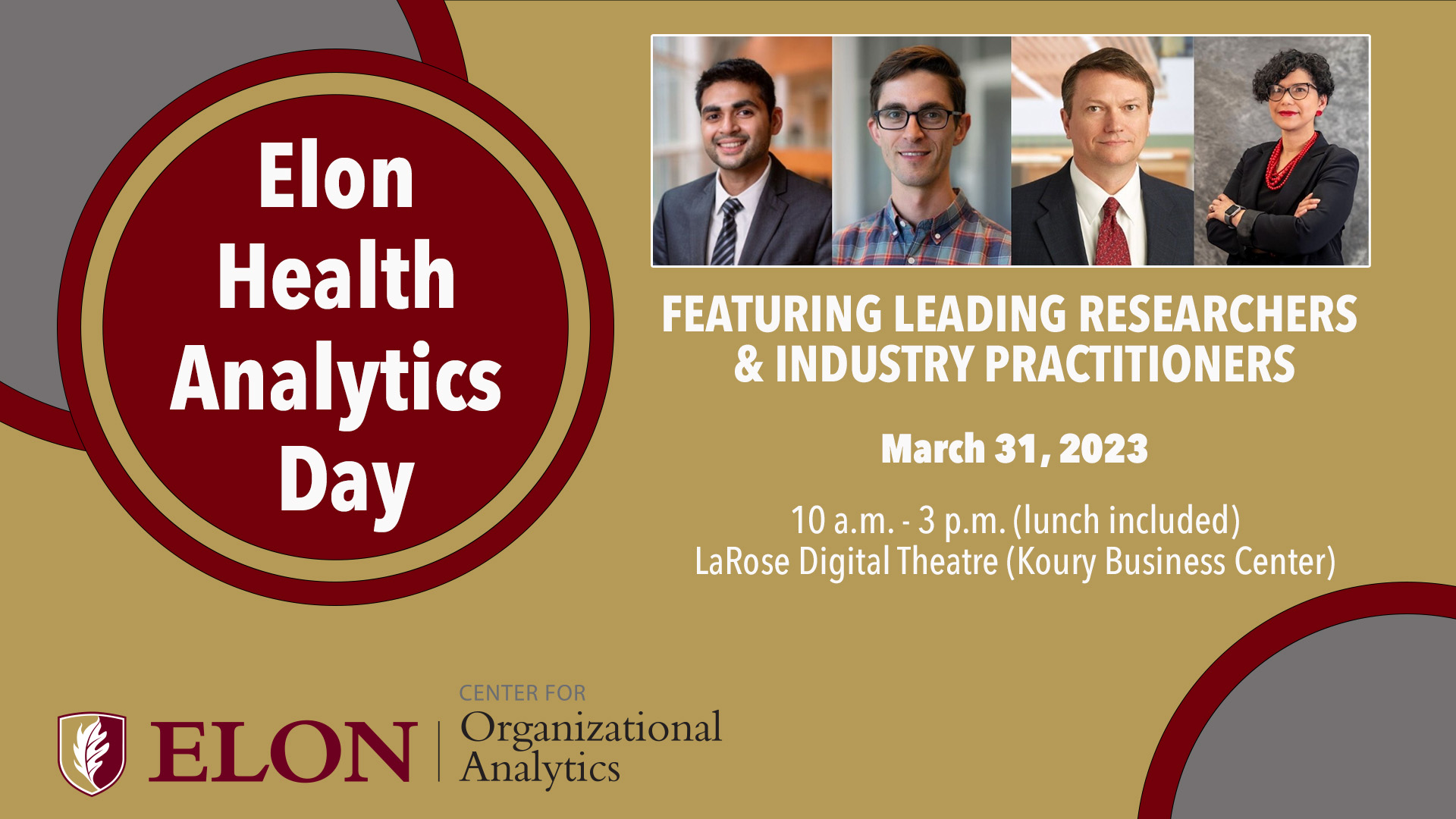- Home
- Academics
- Business
- Center for Organizational Analytics
- Elon Analytics Day
Elon Analytics Day
Learn about important health related applications of data and analytics
March 31, 2023
LaRose Digital Theatre
Koury Business Center
10 a.m. – 3 p.m.
Limited spots available! Registration closes Wednesday, March 29, 2023. Registration is complimentary thanks to the generosity of Center for Organizational Analytics partners. Register today!
- Location & Parking Information
- Questions? Contact Dr. Manoj Chari, director of the Center for Organizational Analytics, at mchari@elon.edu or (336) 278-5912.
Presentations
Session I: Health Analytics to Improve Decision-Making in Clinical Practice
10-10:45 a.m.
Maria Mayorga
The quantity and variety of health data is vast and increasing every day. However, the data is often messy, complex, missing or incomplete and requires domain expertise for sense-making. If we can harness the power of this data, it can be used to improve all parts of the patient care cycle, from prevention to diagnosis to treatment. Furthermore, we can use analytics to not only see patterns in the data, but to improve clinical decision making. Maria Mayorga will discuss some of these challenges and opportunities and provide a brief overview of health analytics-related research projects in Health Systems Engineering at NC State. In addition, Mayorga will provide details on a project which aims to identify individuals at risk of developing vision-threatening diabetic retinopathy. Diabetic retinopathy (DR) is a complication from diabetes which can become vision-threatening (VTDR) and cause blindness. In the U.S., an estimated 899,000 diabetic adults have VTDR despite it being preventable with timely treatment. VTDR is difficult to catch due to the slow progression and dependence on patients’ care-seeking behavior. The project addresses these challenges by leveraging 20+ years of electronic health records to construct and extend ensemble classifiers to (i) identify patients that will develop VTDR within the next year and (ii) to identify those that will develop DR in the next year. The project can achieve high recall (>80%) for both classification tasks. In practice this classifier can personalize care coordination to improve utilization and timing without any additional patient actions.
Session II: Data-driven quantitative methods for improving efficiency, quality, and outcomes in healthcare delivery systems
11-11:45 a.m.
Tarun Mohan Lal
In this presentation, the focus will be on understanding the current challenges of healthcare delivery systems and how analytics can bring about transformation. The presentation will also cover examples of operational analytics problems and their impact on the respective organizations.
Session III: Data Science Responses to an Evolving Pandemic
1-1:45 p.m.
Alexander “Sandy” Preiss
Over the past three years, the COVID-19 pandemic has evolved through many phases. Curve flattening, vaccine uptake, new variants, safe reopening – each phase has presented new analytical challenges. Throughout the pandemic, RTI International has brought the tools of data science to bear on these challenges. In 2020, RTI provided weekly forecasts of hospital occupancy to help the North Carolina government allocate resources. During the omicron surge, it used a simulation model to study how nursing homes could reduce infections among residents. As federal agencies added COVID-related questions to surveys, RTI used natural language processing to quickly extract insights from new data. Now, RTI is working to learn more about long COVID, a poorly understood condition that continues to affect millions of people. Throughout these projects, RTI has learned one key lesson: for data science to realize its potential impact on public health, it must be practiced in close collaboration with subject matter experts and the people with boots on the ground.
Session IV: Operational AI and Analytics: Ministries of Health to integrated Networks and Beyond
2-2:45 p.m.
Steve Kearney
The challenge in our health ecosystem is delivering analytics that can be acted upon. This session will review real-world examples of AI and analytics from a population health level all the way to the patient bedside and beyond. The discussion will be global in nature and include payor, provider, ministries of health and integrated delivery networks. Documented outcomes and recent publications will be provided.
Speakers
 Steve Kearney is the global medical director at SAS where he helps lead the organization’s focus on the future of digital health for R&D, product management, and the SAS Health Solutions team. An innovator in health outcomes and digital medicine, Kearney co-developed and implemented one of the first electronic disease registries at Duke Health where he practiced in both inpatient cardiology and outpatient internal medicine during his joint faculty appointment at Duke and UNC. Kearney then joined the medical outcomes group at Pfizer where he continued his practical actionable approach to data and the patient journey. He focused on health outcome insights from electronic medical record migrations, early personal digital assistants, novel health software programs and the first large patient claims databases. Kearney has completed post-doctoral studies at both UNC Kenan-Flagler Business School and Harvard School of Public Health. He has been asked to testify on numerous occasions for the House and Senate on the opioid crisis, and he has advised HHS and SAMHSA on the opportunity to use big data, machine learning and AI to address the challenges regarding substance abuse. Kearney was appointed in June 2022 to the Office of National Drug Control Policy, Executive Office of the President- Evolving and Emerging Threats Committee.
Steve Kearney is the global medical director at SAS where he helps lead the organization’s focus on the future of digital health for R&D, product management, and the SAS Health Solutions team. An innovator in health outcomes and digital medicine, Kearney co-developed and implemented one of the first electronic disease registries at Duke Health where he practiced in both inpatient cardiology and outpatient internal medicine during his joint faculty appointment at Duke and UNC. Kearney then joined the medical outcomes group at Pfizer where he continued his practical actionable approach to data and the patient journey. He focused on health outcome insights from electronic medical record migrations, early personal digital assistants, novel health software programs and the first large patient claims databases. Kearney has completed post-doctoral studies at both UNC Kenan-Flagler Business School and Harvard School of Public Health. He has been asked to testify on numerous occasions for the House and Senate on the opioid crisis, and he has advised HHS and SAMHSA on the opportunity to use big data, machine learning and AI to address the challenges regarding substance abuse. Kearney was appointed in June 2022 to the Office of National Drug Control Policy, Executive Office of the President- Evolving and Emerging Threats Committee.
 Tarun Mohan Lal is an experienced analytics healthcare leader with a passion for innovation, transformation and community support to improve lives. Lal currently works as a transformation executive consultant for a joint venture between two private equity firms: DKP and GoldenTree. He has a decade of experience in variety of roles including most recently as chief analytics and solutions officer and vice president at Atrium Health, and eight years at Mayo Clinic in leadership roles including analytics, research, strategic planning and service line operations. Originally from India, Lal earned a Bachelor of Science in industrial and systems engineering from Manipal University, a Master of Science in industrial engineering from Texas A&M University, and a PhD in health systems from State University of New York. Lal is author of several publications, and a strong advocate of community support and mentorship/power of coaching. He serves as current president and diplomate of Society for Health Systems and is a member of the board of directors for several organizations. The National Academy of Engineering/DiscoverE named Tarun as one of the 13 “New Faces of Engineering.” He was also recognized by the Institute of Industrial and Systems Engineers as an Outstanding Early Career Young Professional in Industry. In 2021, Lal was awarded Management Award by the Society for Engineering and Management systems for his contributions with pandemic management in south central Georgia and was named 40 under 40 CDO by CDO Magazine in 2022.
Tarun Mohan Lal is an experienced analytics healthcare leader with a passion for innovation, transformation and community support to improve lives. Lal currently works as a transformation executive consultant for a joint venture between two private equity firms: DKP and GoldenTree. He has a decade of experience in variety of roles including most recently as chief analytics and solutions officer and vice president at Atrium Health, and eight years at Mayo Clinic in leadership roles including analytics, research, strategic planning and service line operations. Originally from India, Lal earned a Bachelor of Science in industrial and systems engineering from Manipal University, a Master of Science in industrial engineering from Texas A&M University, and a PhD in health systems from State University of New York. Lal is author of several publications, and a strong advocate of community support and mentorship/power of coaching. He serves as current president and diplomate of Society for Health Systems and is a member of the board of directors for several organizations. The National Academy of Engineering/DiscoverE named Tarun as one of the 13 “New Faces of Engineering.” He was also recognized by the Institute of Industrial and Systems Engineers as an Outstanding Early Career Young Professional in Industry. In 2021, Lal was awarded Management Award by the Society for Engineering and Management systems for his contributions with pandemic management in south central Georgia and was named 40 under 40 CDO by CDO Magazine in 2022.

Maria E. Mayorga is a Professor of Personalized Medicine and Director of Graduate Recruitment and Success in the Edward P. Fitts Department of Industrial and Systems Engineering at North Carolina State University. She is currently serving as the Interim Director of the Operations Research Program. In 2019 she received the C.A. Anderson Award for contributions to teaching and was selected as a University Faculty Scholar for her academic leadership and research achievements. In 2021 she was selected as a Provost Faculty Fellow at NC State and was named an INFORMS MIF Fellow. In 2022 she was named as a Fellow of the Institute of Industrial and Systems Engineers (IISE). Her research interests include predictive models in health care, health care operations management, emergency response, and humanitarian logistics. She has authored over 90 publications and currently serves on the editorial board several IISE and INFORMS journals.
 Alexander “Sandy” Preiss, MS, is a research data scientist at RTI International’s Center for Data Science and AI. Sandy collaborates with subject matter experts to solve problems across public health and social science domains. He deploys solutions including supervised and unsupervised machine learning, natural language processing, simulation modeling, causal inference, and exploratory data analysis. His recent work has covered topics including opioid use, cancer screening, postsecondary education, and the COVID-19 pandemic. He holds an undergraduate degree from the University of North Carolina at Chapel Hill and master’s degrees in analytics and international studies from North Carolina State University. Prior to joining RTI, Sandy managed the evaluation of public health interventions at the American Cancer Society and Ipas. He helped diverse stakeholder groups use data to make decisions, develop strategies, and answer research questions.
Alexander “Sandy” Preiss, MS, is a research data scientist at RTI International’s Center for Data Science and AI. Sandy collaborates with subject matter experts to solve problems across public health and social science domains. He deploys solutions including supervised and unsupervised machine learning, natural language processing, simulation modeling, causal inference, and exploratory data analysis. His recent work has covered topics including opioid use, cancer screening, postsecondary education, and the COVID-19 pandemic. He holds an undergraduate degree from the University of North Carolina at Chapel Hill and master’s degrees in analytics and international studies from North Carolina State University. Prior to joining RTI, Sandy managed the evaluation of public health interventions at the American Cancer Society and Ipas. He helped diverse stakeholder groups use data to make decisions, develop strategies, and answer research questions.
